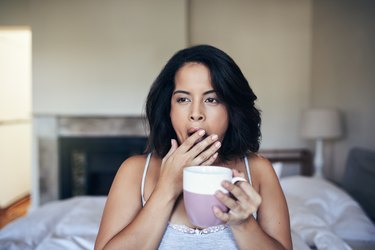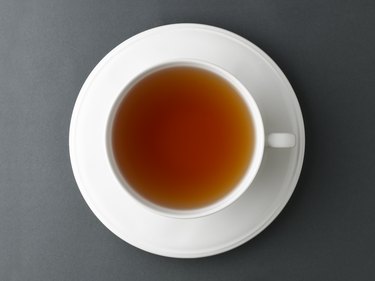
Whether you prefer coffee, tea or soda, caffeinated drinks are a go-to tactic to help you feel alert and energized. But caffeine can affect your body in other ways, too, including your menstrual cycle. So, does drinking caffeine affect your period — for instance, does caffeine delay your period?
Caffeine is a stimulating substance that naturally occurs in plants like coffee beans, tea leaves and cacao pods, according to the U.S. National Library of Medicine (NLM).
Video of the Day
Video of the Day
The jolt of that first cuppa (or other caffeinated products like tea, soda and some chocolate) is caused by caffeine's effect on your brain and central nervous system, per the Harvard T.H. Chan School of Public Health.
But while caffeine can make you feel more awake and alert, there are also some less-pleasant effects of caffeine on the body. According to the NLM, these can include:
- Restlessness and shakiness
- Trouble sleeping
- Headaches
- Dizziness
- Fast heart rate
- Increased urination
- Dehydration
- Anxiety
- Increased blood pressure
- Heartburn
- Dependency
It's also possible that caffeine can affect your period, though exactly how can vary from person to person.
"Each person with a uterus is different and responds differently to caffeine," says Sunnyvale, California-based Sophia Yen, MD, MPH, cofounder and CEO of Pandia Health and clinical associate professor at Stanford Medical School. "Not much medical research has been done on this topic. A medical literature search shows very few studies, some of which are fairly old."
Still, here's what we do know about the potential effects of taking caffeine on your period, according to experts and existing data.
How Much Caffeine Should You Have Per Day?
According to the Mayo Clinic, here are the limits to how much caffeine people should have every day:
- Adults: 400 mg or less (For reference, that's the amount of caffeine in about four cups of coffee.)
- Pregnant people: 200 mg or less
Caffeine and Your Period
So, does caffeine affect your period? It's possible — here's how:
1. It May Shorten Your Cycle
If you're wondering whether caffeine causes irregular periods, it's possible that the stimulant can mess with your typical cycle length.
Indeed, a large August 2013 study of more than 2,500 people in Clinical Epidemiology found that higher caffeine intake was associated with shorter menstrual cycles (meaning less time in between your period).
2. It Could Make You Bleed More
It's possible that caffeine does make you bleed more: The same Clinical Epidemiology research found that people who had more caffeine experienced heavier bleeding during their periods than those with less caffeine intake.
3. It's Linked to Longer-Lasting Periods
A December 2014 study in the Journal of Taibah University Medical Sciences found that some people who drank caffeinated beverages daily, particularly coffee, were at higher risk for experiencing prolonged periods.
4. It's Linked to Infrequent Periods
Does caffeine delay your period? It's possible — the Journal of Taibah University Medical Sciences study found that people who drank caffeine daily were at increased risk for infrequent periods.
However, it's unclear how long caffeine can delay your period. And remember, this is just a link: The study doesn't definitively prove that caffeine causes infrequent periods.
5. It May Prevent Missed Ovulation
A July 2016 study in the American Journal of Clinical Nutrition found that caffeine intake was associated with lower risk of anovulation (missed ovulation), which the authors suggest may improve menstrual cycle function.
The moral of the story: There's room for more studies and your own tracking, given that caffeine affects everybody differently. These data are associations, so the jury is still out on how caffeine may or may not affect your period.
Can Coffee Stop Periods?
There's no evidence to suggest that caffeine directly stops your period.
However, if your period does stop abruptly, talk to your doctor to determine the underlying cause, as it may indicate health issues like hormonal imbalances, pregnancy, stress, uterine problems or polycystic ovary syndrome, per the Ohio State University Wexner Medical Center.
Caffeine, Menstrual Cramps and PMS
Perhaps you've heard that caffeine is good for period cramps. So, is there any truth to that — does caffeine help cramps, or does coffee make cramps worse?
If you love chocolate, here's some good news: According to the Journal of Taibah University Medical Sciences study, among the 350 participants, chocolate was associated with fewer premenstrual syndrome (PMS) symptoms, suggesting that this form of caffeine does potentially help with issues like cramps.
But this may not be true for other sources of caffeine — in fact, it's possible that caffeine may make cramps worse (along with other symptoms of PMS).
"Caffeine is a vasodilator, which causes blood vessels to open up more," says Jana Mowrer, RDN, CDCES, registered dietitian nutritionist and founder of HealthWins Coaching and Consulting in Fresno, California.
"When this happens, [people who get periods] are more likely to feel cramps, headaches and tiredness. Caffeine is a diuretic, which can cause cramping and dehydration," she says.
Some dietitians (and people who get periods) agree with Mowrer that caffeine is bad for period cramps, but here also, the data are inconclusive.
For instance, an August 2016 study in the American Journal of Clinical Nutrition found that caffeine intake of any amount was not associated with worsening PMS, and the authors stated that recommendations to avoid caffeine to lessen PMS may not be helpful.
Bottom line: While you're waiting for conclusive data, check in with your own symptoms as they relate to caffeine and menstrual cramps. If you notice coffee does help with cramps, then it may not be necessary to skip your morning cup.
Keeping a food and symptom diary may also help you determine if you have caffeine sensitivity from PMS, whether coffee does help your cramps and, as a result, if you should quit caffeine each month.
- Harvard T.C. Chan School of Public Health: “Caffeine”
- American Journal of Clinical Nutrition: “A Prospective Study of Caffeine and Coffee Intake and Premenstrual Syndrome”
- Journal of Taibah University Medical Sciences: “Association Between Menstrual Disturbances and Habitual Use of Caffeine”
- American Journal of Clinical Nutrition: “Serum Caffeine and Paraxanthine Concentrations and Menstrual Cycle Function: Correlations With Beverage Intakes and Associations With Race, Reproductive Hormones, and Anovulation in the BioCycle Study”
- U.S. National Library of Medicine: "Caffeine"
- Clinical Epidemiology: "Correlates of menstrual cycle characteristics among nulliparous Danish women"
- Mayo Clinic: "Caffeine: How much is too much?"
- Ohio State University Wexner Medical Center: "Is it normal to miss periods?"
Is this an emergency? If you are experiencing serious medical symptoms, please see the National Library of Medicine’s list of signs you need emergency medical attention or call 911.


